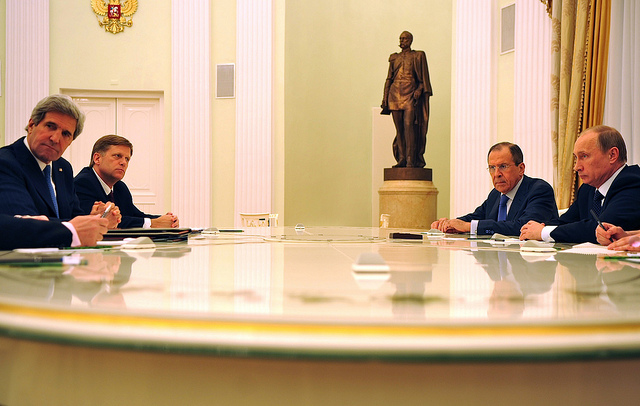 flikr, U.S. Department of State
flikr, U.S. Department of State
When Diplomacy Fails, Try Again: Russia Plays a Dangerous Game
Last week the U.S. and Russia engaged in a dangerous and escalating diplomatic game that culminated in the suspension of cooperation between the two over Syria on Monday. The move was preceded by President Putin’s announcement that Russia was suspending the Plutonium Management and Disposition Agreement (PMDA), which called for the disposal of 34 tons of excess plutonium reserves that could be used for nuclear weapons.
The PMDA itself was just one of the nuclear non-proliferation efforts that followed the fall of the Soviet Union, with negotiations for the agreement beginning in the 1990s and agreed upon in 2000. In the PDMA, plutonium is disposed of by mixing the material with uranium in a light water reactor (LWR), creating a MOX fuel. The cost of constructing a LWR was estimated at $1.8 billion at the signing of the agreement in 2000, but rose to $4.1 billion in subsequent years. This dramatic increase in costs, and the choice of a LWR instead of a fast-neutron reactor, endangered Russia’s evolving nuclear energy strategy and invalidated the agreement in its original form. A newer version of the agreement, the one suspended by Russia last week, was agreed upon in 2010.
This move certainly undermines two decades of nonproliferation efforts that followed the end of the Cold War, and signals a shift by Russia to move further away from positive relations with the United States.
Yet President Putin’s move away from disarmament reflects a changing global context in which Russia plays a weaker hand than it’s comfortable with, and it is unlikely that Russia truly wants to push the U.S.-Russian relationship closer to tension levels unseen since the Cold War. To understand the intent behind Russia’s recent actions, it is critical to look at the factors that contribute to Russia’s weak hand.
Russia Plays a Weak Hand
- The Russian economy is stagnating due to low oil prices and sanctions that were in imposed by the E.U. and U.S. in 2014.
- The Russian conventional military is much less advanced in technology and size than the counterparts it wishes to engage.
- The Russians influence in the Middle East is directly linked with the survival of the Assad regime, and with the Syrian conflict running into its fifth year, Syria may become another Afghanistan for the Russians.
Additionally, Russia has interpreted an increase in U.S. missile defense initiatives as a threat. From the U.S. perspective, the deployment of missile defense assets was aimed at protecting Europe and Asian allies against potential threats from Iran and North Korea respectively, threats that would be smaller in scale but higher in probability than a Russian attack. While these initiatives would be ineffective in protecting our allies from a Russian attack, they seem to have stoked both deterrence insecurity and proximity fears within Russia.
This combination of factors incentivizes President Putin to push the limits of the U.S.-Russian relationship to project power. But rejecting the PMDA does not represent a shift towards hostility that the U.S. must match. Instead, the U.S. response should be informed by the following current events and lessons learned from the Cold War.
What Should Inform the U.S. Response?
- At this point, halting the destruction of nuclear grade uranium does not necessarily mean Russia will build more nuclear weapons out of that material.
- The U.S. is currently pursuing a new effort to modernize existing air, land, and sea delivery systems, including warheads. Russia is doing the same, and is halfway through its 2011 plan to invest $700 billion into its nuclear arsenal. Neither states are increasing their stockpile of warheads, instead replacing them.
- The legacy of Euromissiles Crisis teaches both the U.S. and Russia of the dangers of missile escalation, and it is highly unlikely that Russia wants to recreate this scenario.
At the moment, Russia poses no immediate threat to the U.S. and it is important that the U.S. does not exhibit disproportionate reactions in response.
Instead, the answer must be an increase in diplomatic efforts that are backed by a credible and proportional military deterrent. We know Russia is aiming for an end to sanctions over Ukraine and preservation of the Assad regime in Syria, both options the U.S. will not and should not compromise over. The key now, is to find the correct bargaining chip to warm U.S.-Russian relations without appeasing aggression.





